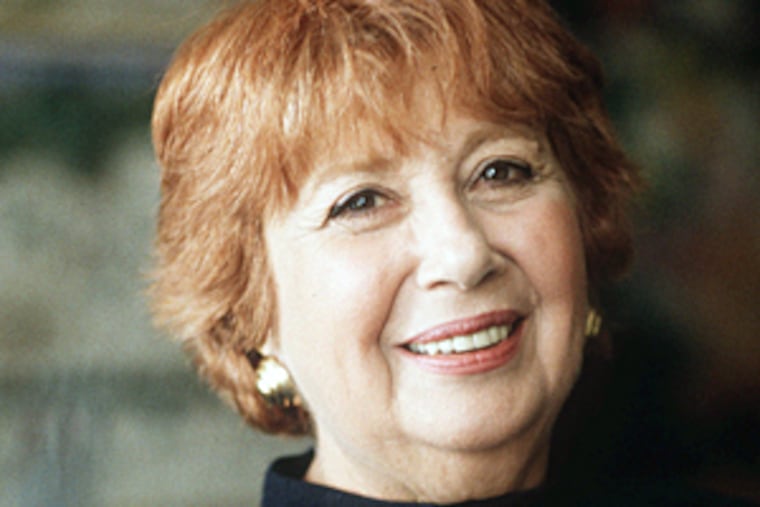Opera star Beverly Sills dead at age 78
Beverly Sills, 78, one of the greatest and most distinctive opera singers to emerge in the United States in the 20th century, died Monday night of cancer, her manager said.

Beverly Sills, 78, one of the greatest and most distinctive opera singers to emerge in the United States in the 20th century, died Monday night of cancer, her manager said.
Ms. Sills' inoperable lung cancer was made public just last month. She died about 9 o'clock, said her manager, Edgar Vincent.
Although Ms. Sills retired from performing 27 years ago, she never ceased to be a crucial figure: Shortly before retirement, she became the administrative head of the New York City Opera, the company that had nurtured her, and saved it from financial ruin. Later she was a key figure in Lincoln Center's administration, even as she continued to lend her warmth and charisma to Live from Lincoln Center and Metropolitan Opera simulcasts.
She was the mother figure of American opera. Or daughter figure. Or big-sister figure. As one intimate put it, to know about Ms. Sills was to feel as though you were related.
Only months ago, she was on the Metropolitan Opera simulcast of I Puritani, joking between scenes that the opera had notes so high "only a dog can hear them."
Born Belle Miriam Silverman in Brooklyn in 1929, she was the rarest of child prodigy musicians - a singer.
She appeared on numerous radio shows before undergoing serious vocal training with Estelle Liebling, an expert in bel canto opera who taught her the kind of dramatic values that insisted text came first, music second. That molded her into an intelligent and resourceful singing actress. All the while, Ms. Sills memorized recordings by the then-reigning coloratura soprano Lily Pons, and spoke fluent French at a young age, thanks to a French nanny.
She toured in various shows billed as "the youngest diva in captivity," but continued serious vocal study, commuting weekly to Philadelphia for lessons with Giuseppe Bamboschek, a Caruso-era conductor. In her official operatic debut, she was Micaela in a 1947 Philadelphia Civic Opera production of Carmen. Her breakthrough performance with the New York City Opera in Handel's Julius Caesar came in 1966.
Instead of honing her early career skills in European opera houses, Ms. Sills stayed close to home, singing with companies large and small in North America. She continued to perform outside the world's operatic capitals - including concerts with the Pittsburgh Symphony Orchestra in Ambler and opera performances in Trenton and regularly at the Robin Hood Dell. One of her last full opera performances before her 1980 retirement was at the Mann Center for the Performing Arts.
Though Ms. Sills also performed at the Metropolitan Opera, La Scala and the Royal Opera House at London's Covent Garden, such companies never were her artistic homes.
An easygoing, good-humored artist happy to appear on TV talk shows to prove that opera wasn't just, as she put it, "fat ladies with horned helmets," she had a strong sense of independence and originality. Even when studying Massenet's Manon with the legendary Mary Garden, Ms. Sills rebelled, and formed her own interpretation. She gravitated toward companies that encouraged such values, such as Sarah Caldwell's Opera Company of Boston and, most of all, the New York City Opera.
Her stage portrayals were conceived holistically; she had much input in matters of costume and makeup.
Ms. Sills needed collaborators who believed in her because she wasn't always an obvious choice for the places her theatrical ambitions took her - and she admitted to resorting to coercion at times.
When campaigning for the role that made her a star, Cleopatra in Julius Caesar, she threatened to rent Carnegie Hall and perform an evening of arias from the opera to prove she was better than another singer who was the top contender.
When she heard that composer Douglas Moore thought her too tall for the title role in his opera The Ballad of Baby Doe, she defiantly auditioned in her tallest shoes and highest hat.
Though she had the vocal agility and virtuosity that made her well-equipped for the bel canto operas of Bellini, Rossini and Donizetti, she lacked the dark tone of Maria Callas or the formidable vocal purity of Joan Sutherland.
Ms. Sills had a soubrette voice, usually the vehicle of comic roles such as Rosina in The Barber of Seville. By taking on heavier roles in rarely heard Roberto Devereux - which the New York City Opera was willing to mount for her - she knew she was shortening her vocal life.
No matter. She had long planned to retire from singing at age 50, in part because of family concerns. She and her husband, journalist Peter Greenough, whom she married in 1956, had two children - Meredith (Muffy), who is deaf, and Peter Jr. (Bucky), who is mentally disabled. Greenough died last year.
The fact that she didn't have to worry about supporting her family - Greenough was independently wealthy - meant that she could choose her projects with a freedom even the greatest stars don't enjoy. She bridled at repertoire-style opera in which her characterizations were inevitably compromised by productions created for other singers. Those productions didn't allow her to convey the myriad effects she envisioned.
She was most famous for the title role of Massenet's Manon, a character easily portrayed as materialistic, faithless and superficial. But even in Manon's most corrupt moments, Ms. Sills projected a childlike fascination with and joy in the sensual pleasures of life. She often said the key to Manon is creating a woman whom the wives in the audience won't hate.
Offstage, Beverly Sills was just as winning, but in a completely different way. In contrast to her silvery singing voice, her speaking voice was that of a New York cab driver - perhaps even a baritone. And though her sense of humor wasn't ribald, it definitely was earthy.